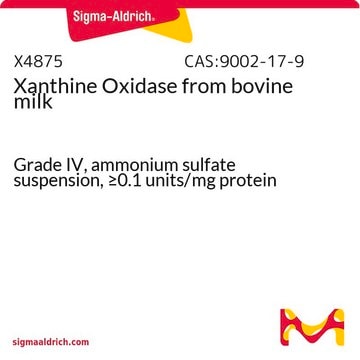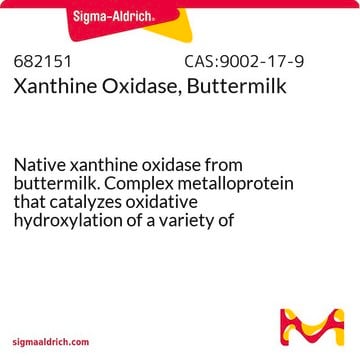X1875
Xanthine Oxidase from bovine milk
Grade I, ammonium sulfate suspension, ≥0.4 units/mg protein
Sinónimos:
XOD, Xanthine:oxygen oxidoreductase
About This Item
Productos recomendados
type
Grade I
Quality Level
form
ammonium sulfate suspension
specific activity
≥0.4 units/mg protein
foreign activity
uricase ≤0.5%
shipped in
wet ice
storage temp.
2-8°C
¿Está buscando productos similares? Visita Guía de comparación de productos
General description
Application
- in the preparation of xanthine oxidase (XO) solution for 5-(diethoxyphosphoryl)-5-methyl-1-pyrroline-N-oxide (DEPMPO)-spin trapping assay
- in in vitro XO assay for screening Vietnamese medicinal plants for XO inhibitory activity
- as a standard to determine XO activity
- as a standard to test the synergistic effect of docosahexaenoic acid (DHA)
Biochem/physiol Actions
Unit Definition
Physical form
Analysis Note
signalword
Danger
hcodes
Hazard Classifications
Resp. Sens. 1
Storage Class
11 - Combustible Solids
wgk_germany
WGK 3
flash_point_f
Not applicable
flash_point_c
Not applicable
ppe
Eyeshields, Gloves, type N95 (US)
Certificados de análisis (COA)
Busque Certificados de análisis (COA) introduciendo el número de lote del producto. Los números de lote se encuentran en la etiqueta del producto después de las palabras «Lot» o «Batch»
¿Ya tiene este producto?
Encuentre la documentación para los productos que ha comprado recientemente en la Biblioteca de documentos.
Los clientes también vieron
Artículos
Instructions for working with enzymes supplied as ammonium sulfate suspensions
Protocolos
Enzymatic Assay of Superoxide Dismutase
Nuestro equipo de científicos tiene experiencia en todas las áreas de investigación: Ciencias de la vida, Ciencia de los materiales, Síntesis química, Cromatografía, Analítica y muchas otras.
Póngase en contacto con el Servicio técnico












